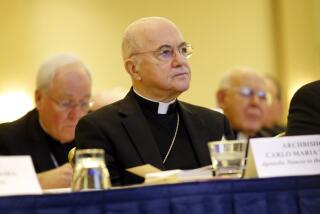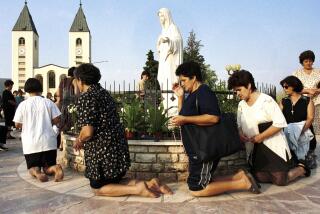Opinion: No, the pope isn’t denying Communion to Catholics with celiac disease
“Vatican Refuses to Go Gluten Free at Communion” blared the headline on a New York Times story about a recent directive by the Congregation for Divine Worship. The instruction to the world’s Roman Catholic bishops sets out rules for the types of bread and wine that may be used in the sacrament in which, according to Catholic belief, they become the body and blood of Christ.
The passage that has attracted media attention — and a bit of snark — says: “Hosts [Communion wafers] that are completely gluten-free are invalid matter for the celebration of the Eucharist.”
Does this mean that Catholics who suffer from celiac disease – a condition experienced by about 1% of the general population – are barred from receiving the “Bread of Heaven”? Is this an example of ecclesiastical legalism triumphing over Christian charity? (The satirical website the AV Club titled its story “Pope Francis Doesn’t Care About your Celiac Disease.”)
Actually, no.
First of all, as the directive makes clear, the church is willing to accept as valid bread with minute amounts of gluten – sufficient, as the directive puts it, “to obtain the confection of bread without the addition of foreign materials and without the use of procedures that would alter the nature of bread.”
That would appear to permit the use even of some wafers that carry a “gluten-free” label. The U.S. Food and Drug Administration allows that designation for bread that contains less than 20 parts per million of gluten.
More to the point, even if wafers that meet the Vatican’s standards are unavailable at a particular parish, the church says that worshipers with celiac disease may still receive all the spiritual benefits of Communion by consuming only the consecrated wine.
Thereby hangs a theological tale.
Since the Vatican Council of the 1960s it has become common, though not universal, for Roman Catholics to receive both the consecrated bread and the consecrated wine at Communion. But from the Middle Ages until Vatican II, typically only the priest received Communion under both “species” – a source of controversy between Catholics and Protestants during and after the Reformation.
At the Council of Trent in the 16th century, the Roman Catholic Church justified the practice of having the laity receive only the consecrated bread at Communion. Although in the New Testament Jesus is described as saying, “This is my body,” of the bread at the Last Supper and “This cup is the new testament in my blood” of the wine, the council said that Christ “whole and entire” was present in both the bread and the wine. Therefore, the communicant with celiac disease can receive only consecrated wine and still obtain the full spiritual benefit of the sacrament.
This doctrine, known as concomitance, arguably undermines the symbolic parallelism of body/bread, blood/wine. But it offers a solution for the worshipper at a church that doesn’t offer low-gluten Communion bread.
But what if that worshipper is also unable to tolerate alcohol?
The church also has a solution to that problem: It’s called mustum, a form of grape juice in which the process of fermentation has begun but is then arrested. The Vatican letter restates the church’s position that mustum is “valid matter for the celebration of the Eucharist.”
In a position paper that was updated last year, the U.S. Conference of Catholic Bishops recommended that “individuals with gluten and/or alcohol intolerance arrange through their parish the purchase any low-gluten hosts or mustum” and provided a list of companies that offered such products for sale. (Whether enough parishes are taking advantage of these products is another question.)
Many non-Catholic Christians – and even some Catholics – will probably dismiss the Vatican’s directive as metaphysical nitpicking. Surely, some would argue, the Lord wouldn’t begrudge his presence because of a fine point of chemistry. But, having decided that bread and wine are crucial to the sacrament, it’s not surprising that the church would try to define those elements.
What matters is that it has done so in a way that doesn’t exclude believers with physical conditions that, on a different reading, might have kept them away from the Communion rail.
Follow the Opinion section on Twitter @latimesopinion and Facebook
More to Read
A cure for the common opinion
Get thought-provoking perspectives with our weekly newsletter.
You may occasionally receive promotional content from the Los Angeles Times.











